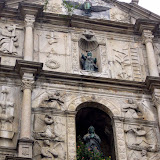Life is really a Mess
Sunday, March 25, 2007 by Eva.Usermaatre

Until yestday, I found my life was really a great mess. Because I will have the most miserable in the coming week.
On friday, I had a tutor with Pro Hess, and he told us that we should have no Easter holidays at all, because we have to finish reading about the termpaper materials and then begin writing. Unfortunately, I have already joined a travelling group to Cambodia. I have been dreaming going to Cambodia for a very long time, last time I failed of going that. Finally I can go, but the damned termpaper block me. But anyway, I can figure it out, I have to begin reading this week, trying to have a general idea of my termpaper. Amun-Re with me!!
Then I also have to plan and make choice of my scholarship. Last semester I won a scholarship of going to Germany for language study purpose. Maybe it will last 3-6 weeks. I am not sure. And it was yestday, Paulus wrote a mail to me and told me that I have been accepted by that organization. Now I have to choose the location in Germany. Although I had a general plan, but I am not sure whether oe not it can work. My location will be Berlin, several reasons: 1, I really wanna visit the museums there, especailly the famous bust of Nerfertit and the Egyptian Museum. 2, Berlin has many places worth visiting. 3, for books reason, I wana see what the bookstore looks like in Germany( a little bit Stupid.....)4, the position of Berlin. Because it will be very easy of going different places, z.B. Dresden, Leipzig So that I can make a round trip in Germany. And also I want to visit Germany in June, because that I will have a large time range of visiting. I can have enough time of going home. But I have to talk to Paulus and find out whether it can work.
Other small things also trouble me. For example, next monday I will have a presentation of a ghost story which was written by myself. Next week is the due day of my Chinese work, and also I will have a small quiz about Chinese characters. God knows how long have I not written in Chinese, I almost forget the feeling of writing Chinese, and I can not remember the characters. I have to bring back my passport from tralvelling agent. Oh, I almost forget a very important thing, I will have a German exam after Easter, shit, I should begin reviewing tonight!
I feel that I still many things forget, any way fight!



















